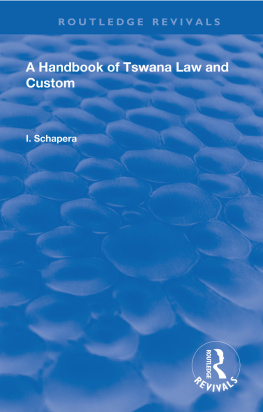First published in 1938 by Frank Cass & Co. Ltd. arrangement with the International African Institute
This edition first published in 2018 by Routledge
2 Park Square, Milton Park, Abingdon, Oxon, OX14 4RN and by Routledge
52 Vanderbilt Avenue, New York, NY 10017, USA
Routledge is an imprint of the Taylor & Francis Group, an informa business
1938 by Taylor & Francis
All rights reserved. No part of this book may be reprinted or reproduced or utilised in any form or by any electronic, mechanical, or other means, now known or hereafter invented, including photocopying and recording, or in any information storage or retrieval system, without permission in writing from the publishers.
Publisher's Note
The publisher has gone to great lengths to ensure the quality of this reprint but points out that some imperfections in the original copies may be apparent.
Disclaimer
The publisher has made every effort to trace copyright holders and welcomes correspondence from those they have been unable to contact.
A Library of Congress record exists under ISBN:
ISBN 13: 978-0-367-14199-8 (hbk)
ISBN 13: 978-0-429-03072-7 (ebk)
Cass Library of African Law
No. 4
eneral Editors: NEVILLE RUBIN AND EUGENE COTRAN
SCHOOL OF ORIENTAL AND AFRICAN STUDIES, LONDON
A HANDBOOK OF TSWANA LAW AND CUSTOM
WHETHER from the point of view of the anthropologist or the administrator, it is surely a desirable thing in any African Territory that all available information bearing on the matter of Native Customary Law should be collected with such measure of accuracy as may be possible, and recorded in permanent form.
And in the Bechuanaland Protectorate there exists an especially strong case for such action. For the changes which have already taken place in that country, and the still greater changes which are materializing, have tended in an increasing degree to obscure the ancient laws and customs obtaining among the tribes inhabiting Bechuanaland, thereby rendering more difficult the task of the Chiefs through whom it is the aim of the Administration to govern, and the work of the officers of the Administration themselves.
The older generation of Chiefs of the Bechuanaland Protectoratemen such as Kgama of the Ngwato, Sebele I of the Kwena, Bathweng I of the Ngwaketse, and Lentswe of the Kgatlahave passed away, and their places have, for the most part, been taken by younger men whose knowledge of Native Customary Law is admittedly very much less than that of their predecessors.
Moreover, the old general Tswana Law has in many cases been varied in the different tribes which go to make up the inhabitants of the Protectorate. Thus, for example, Kgama himself made changes of material importance, and time and circumstances have induced changes elsewhere as well.
That the Tswana themselves realize both the divergence of custom which has flowed from various causes, and the ignorance of their law amongst themselves, is evident from the public discussions on the matter which have taken place at meetings of the Native Advisory Council, notably those held in March 1927, April 1928, March 1929, and April 1930.
One speaker stated that:
'It also occurs to me that as it is laid down that cases among Natives are to be decided in accordance with Native law and custom the Council should record all these laws and customs because there are young Chiefs coming on who do not know these laws and may seek advice from those of their own age only.'
And at a later meeting another speaker said:
A further illuminating remark was to the effect that:
'We fear that in the case of a newly appointed Chief who does not know the Native laws and whose Councillors might give him different advice he may give wrong decisions.'
And various speakers agreed that the different tribes had different laws and customs and that there was much ignorance amongst themselves as to what they were.
It was accordingly the source of much gratification to myself personally when my proposals for an investigation of this matter were accepted, and we have indeed been fortunate in securing for this purpose the services of Dr. Schapera of the Cape Town University.
The results of his researches are embodied in the present work, the exhaustive character of which may be readily gathered from a mere perusal of the chapter headings. Indeed, his work goes even further than a mere recital of custom or law. It reveals many interesting aspects of tribal life which must be of great value to the anthropologist and of great assistance to the Administration.
It is necessary, however, to utter a word of warning in this connexion. This compilation is not in any way intended to be used as a legal code. Such would for obvious and various reasons be very undesirable.
It is intended as a guide to officers when dealing with matters concerning tribal administration, which, of course, is part of their everyday life and work. To suggest that these customs should be inscribed as a whole in the form of a legal code would, for example, tend to perpetuate some customs which are in themselves undesirable and others which, owing to the efflux of time and the advent of changes, have become inapplicable.
Interesting, therefore, as this compilation is, and valuable as it must be for administrative purposes if properly used, it must be read subject to the limitations indicated above.
'I think it will be a great help if such a book could be made. Most of us, although we are Bechuana, do not know our laws and customs.'
In this connexion I do not think I can do better than to quote the following paragraph from a memorandum issued by Sir Herbert Stanley when High Commissioner of the Territories:
'In the affairs of men nothing can remain stationary. As the years pass, conditions change, and institutions and forms of government which do not adapt themselves to changing conditions, and progress with them, lose their vitality and sink into decay. The Bechuana are no longer the very primitive people that they were some forty years ago. Contact with European civilization, and the gradual spread of education, have affected appreciably, though in varying degrees, many of their thoughts and ways of life; and systems and methods which may have sufficed forty years ago must, if they are to survive at all, be brought into line with changing conditions and must be rendered capable of further development in conformity with such changes as the future may bring forth.'









